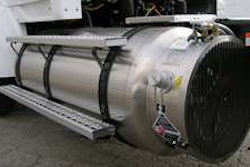No age or BMI cutoffs, says FMCSA
In a Dec. 2 meeting conducted by the Federal Motor Carrier Safety Administration’s Office of Medical Programs aimed at addressing the questions about coming changes to medical certification regulations of commercial drivers, the agency’s Chief Medical Officer Benisse Lester and medical programs chief Elaine Papp both repeatedly emphasized the case-by-case nature of most areas of medical disqualification.
“The primary concerns are the driver’s physical ability to function while operating a commercial vehicle,” said Papp in response to a question about a potential federal cap on the age of commercial drivers. “Medical requirements should be performance-based and not linked to age. We’re not looking at making any changes based on age at this point.”
Similarly, regarding the subject of Body Mass Index, a measurement which expresses the ratio of fat to muscle in an individual, FMCSA medical programs director Mary Gunnels said BMI would not be a factor by itself in any testing mandate for conditions associated with obesity, such as sleep apnea. A BMI number above 30 is considered to indicate obesity. Gunnels, Lester and Papp all stressed it was just “one among many measurements associated with determining obesity,” in Gunnels’ words, and that “we don’t have a specific requirement on testing.”
FMCSA’s Medical CDL program, set for full implementation in January 2012, feeds medical certification data directly to the CDL Information System database. Combined with a reporting requirement for approved examiners linked to the medical CDL, it will be much harder for drivers whose certifications have been disqualified or lapsed to slip through the regulatory cracks.
As more information is gained from medical examiners, FMCSA will be able to more easily enforce requirements placed on drivers to disclose any change in health that could affect medical certification, such as deteriorating vision.
— Todd Dills







